Education is essential to creating a more equitable world. So we’re working with partners to reach learners in over 100 countries and regions, support educators, build out-of-school learning opportunities, and advance racial equity and justice. Because expanding access to education gives everyone more ways to realise their potential.
Education moves learners, leaders, innovators, communities and everyone forward.
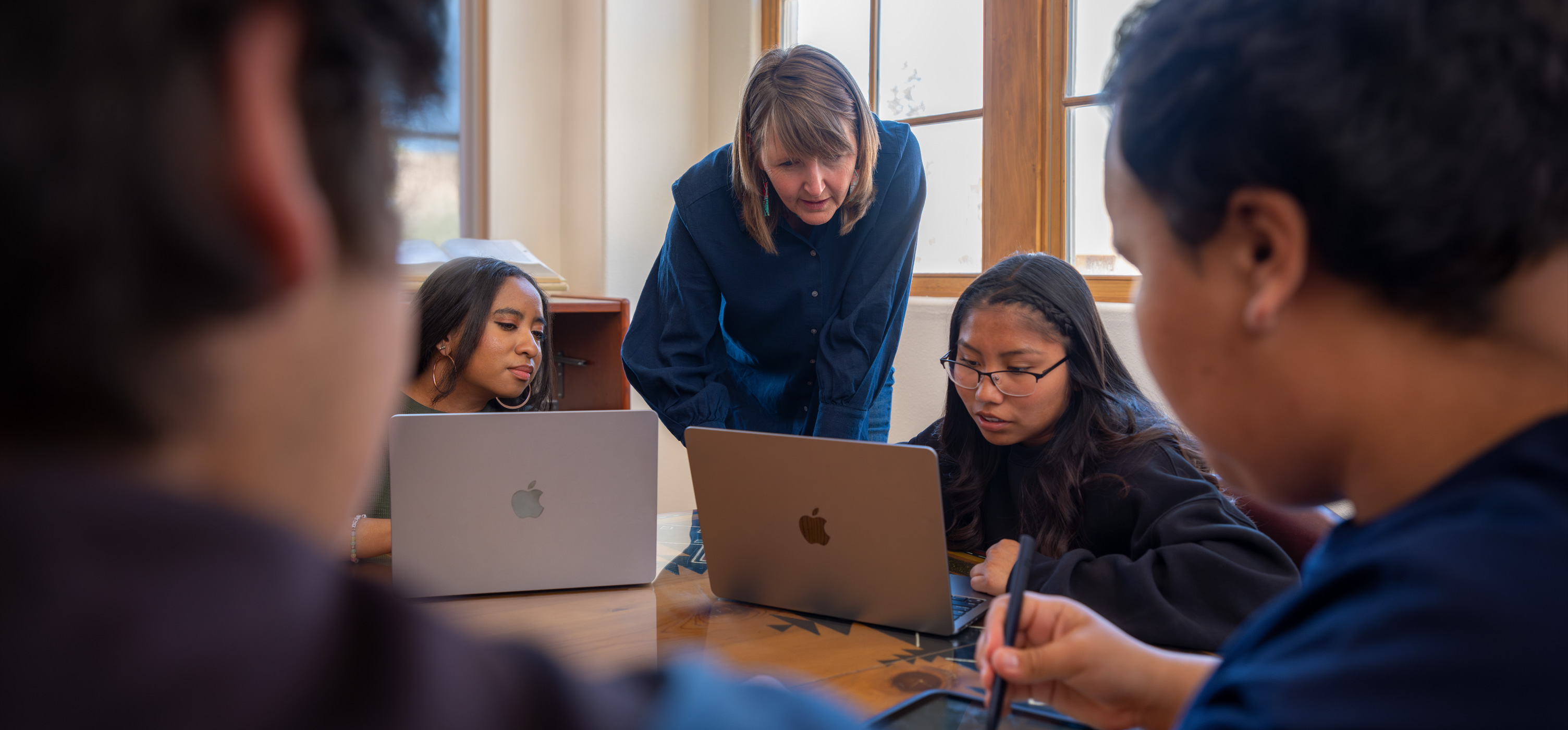




Santa Fe Creative Coding Initiative, Santa Fe
National Coalition of 100 Black Women, Inc., Atlanta
Rutgers University–Newark
(G)eneration Code, Newark
Tennessee State University HBCU C2, Accra
Enactus, Monterrey
Standing alongside educators to move learning forward.
We work closely with educators to engage and inspire learners — and invest in their professional development by providing resources including curricula, mentorship and tools.
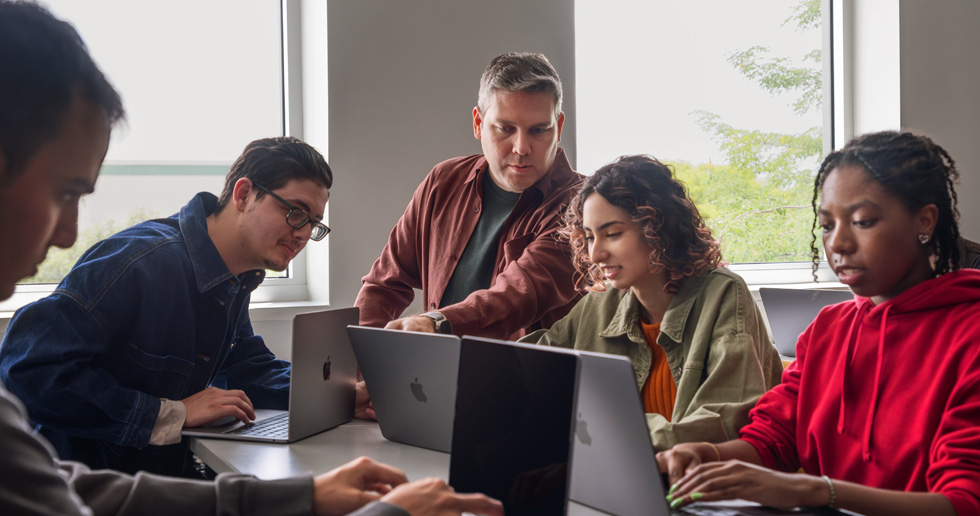
to teach
code —
and change lives.
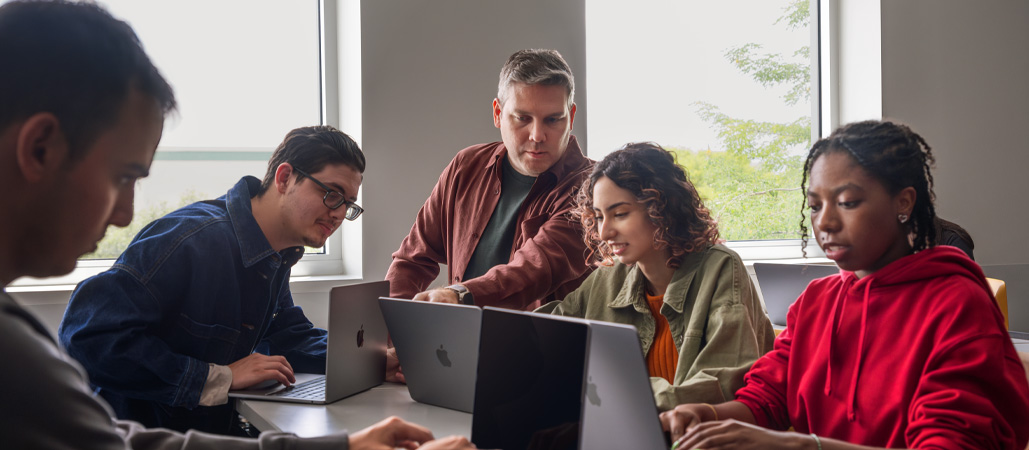
Teaching educators to teach code — and change lives.
Before becoming an instructor at Miami Dade College, Eduardo Salcedo pursued his passions for education, technology and people as a data scientist and information technology student.
In 2022, Salcedo found a new way to make an impact. He signed up for a class teaching educators how to lead coding classes. Through a collaboration between Miami Dade College, the National Coalition of Certification Centers (NC3) and the Apple Community Education Initiative, this programme provides training to educators who then help turn students into professionals through training, educational programmes and certifications.
Since 2020, Miami has seen a significant boom in tech jobs, and Miami Dade College is preparing its community to fill the gaps. Miami Dade College is dedicated to helping its diverse population, many of whom are immigrants, join the local and global workforce with the skills they need to thrive. The school’s partnership with NC3 is adding individuals like Salcedo to the instructor pipeline.
“People need to be bilingual. Everyone needs to know how to code”, says Salcedo.
Peer-to-peer learning is a cornerstone of the 2-week NC3 programme. With little to no coding experience, each educator obtains the certification to train others to teach what they learn. The curriculum is built from Apple-developed education materials using the Swift coding language and makes it simple for teachers without any prior programming knowledge to learn to code, prototype an app and teach others to do the same.
“Teaching instructors is very different from teaching students”, says Salcedo. “We lead with questions like ‘How do you talk to a student who knows nothing about programming? How do you explain something to someone who’s never touched a Mac before?’ We focus on strategies and how to be successful.”
Salcedo is now a Master Instructor with NC3, facilitating in-person trainings for faculty at other community colleges and non-profits. A remarkable 96% of educators who take his class pass their certification testing.
One student who found success after attending Salcedo’s coding course offered at Miami Dade College is Luis Napoles. Just 6 months after he arrived in the United States from Cuba, Napoles’ app, On Watch, was featured in a programme showcase. This achievement marked a major milestone in his new life in the US and his career ambitions. He is now a
full-time, skilled IT professional working in Miami, where he effectively applies the concepts he learned in the Apple Swift course.
But the programme is about more than just new skills and passing grades. NC3 has created a community of educators across the nation.
Many participants collaborate on programme enhancements and teaching methods — and that community is rapidly expanding. Miami Dade College is part of the Global Hispanic-Serving Institution (HSI) Equity Innovation Hub and serves as a Regional Equity Innovation Hub, an Apple-supported initiative in partnership with California State University, Northridge. These distinctions — and robust investment by Apple — empower Salcedo and Miami Dade College to act as a resource for other HSIs interested in preparing learners to succeed in the most sought-after careers in the tech economy.
“In the almost 2 years with NC3, I’ve met 40 to 50 instructors who are changing lives in terms of teaching students new skills that they can use in the workforce immediately”, says Salcedo.
UP NEXT

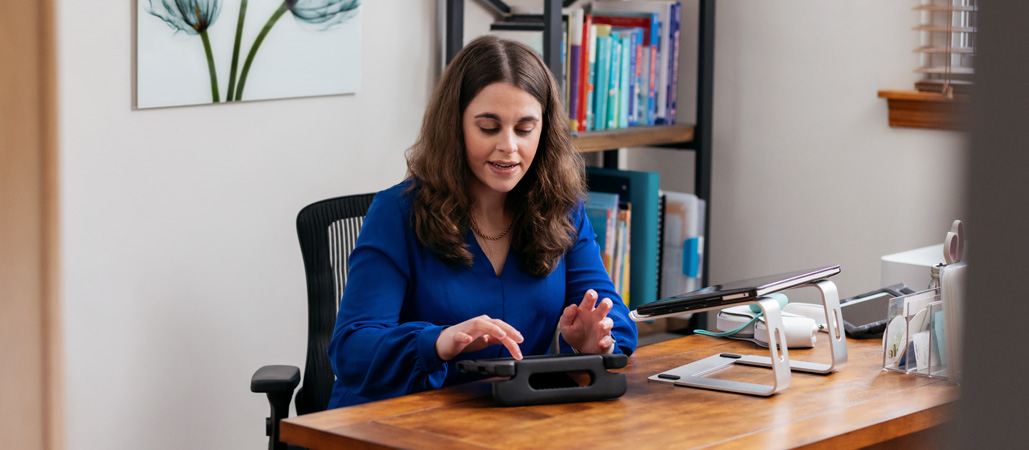
Reducing barriers to access for inclusive education.
Diagnosed as autistic at a young age, Jordyn Zimmerman was full of thoughts and ideas. But she struggled to communicate them until the age of 18, when a team of advocates supported her access to iPad and communication apps. These tools enabled her to begin to convey her knowledge, express her curiosity and advocate for her needs. Zimmerman often points out that lack of speech does not mean lack of language when she advocates for access to robust communication tools for herself and for others who are non-speaking.
Zimmerman earned her bachelor’s degree in Education Policy from Ohio University, where she worked for a more inclusive university experience for herself and others. She also completed a master’s degree in Education at Boston College and is earning a master’s degree in Business Administration.
Through her experiences in education, she recognised the inequities and injustices that existed for people with disabilities and decided to expand her advocacy to help others. She began to have conversations about systems and structures that cause inequity. Now, through policy work and partnerships, she continues to reduce barriers to access.
Her efforts led to an appointment as board chair of the national non-profit organisation CommunicationFIRST and serving on the US President’s Committee for People with Intellectual Disabilities (PCPID). There she collaborates with government agencies to identify barriers and opportunities, influence policies and promote initiatives that support inclusion and accessibility for people with disabilities.
“It’s really incredible to contribute to changing systems. This work is ongoing and I don’t have all the answers, but if I can start conversations that lead to reduced barriers to access through policies or partnerships, that’s huge”, says Zimmerman.
Zimmerman’s work is centred around accessibility and inclusion, which includes access to experiences and products that everyone can use and learn from. And while accessibility is a component of inclusion, alone it isn’t enough. “To foster true inclusion, you must not only have technological tools — they must be supported physically or digitally so people with disabilities can navigate their environments with dignity, respect and autonomy”, says Zimmerman.
As head of product strategy for the Nora Project, she co-designs curricula that provide educators and learners with tools to help them work through exclusionary practices, and a framework for evaluating, researching, collaborating and addressing barriers to belonging. These resources allow learners to generate ideas, collectively define problems around access and identify innovative solutions for design and implementation.
“Educating others gets us thinking as a community and allows for more innovative problem-solving”, says Zimmerman. “In turn, this enables all people to engage fully.”
As part of the Apple Distinguished Educators (ADE) community, a group of pioneering educators who are using Apple technology to transform teaching and learning, Zimmerman demonstrates thought leadership among her peers to ensure that they have access to innovative teaching and learning strategies for students with disabilities.
She has been credited with shifting how ADEs think about accessible technology in the classroom. Zimmerman is a powerful presenter and shares resources on the Apple Education Community, an online professional learning hub for educators who are using Apple technology — including curricula that integrate inclusive design principles. Her work gives other educators access to more opportunities to challenge the systems that perpetuate exclusion.
“I’m just really honored to be in a space with so many incredible educators”, says Zimmerman. “And to be making an impact in the lives of others.”
Read Zimmerman’s post in the Apple Education Community Forum
UP NEXT
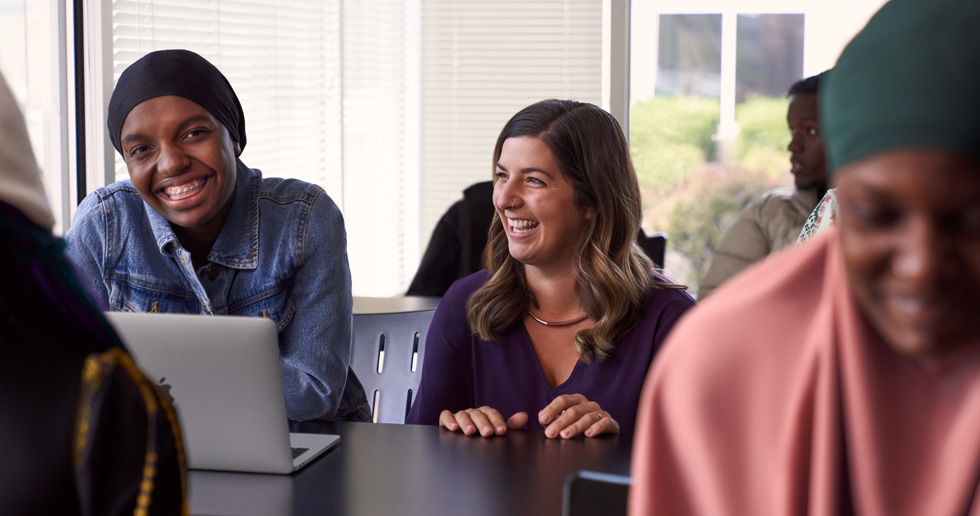
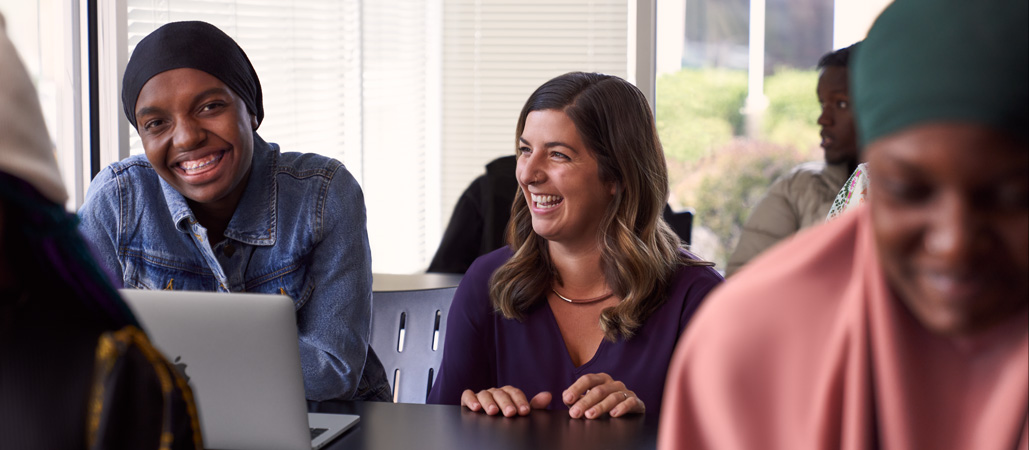
Learning English by learning to code.
For many immigrants and refugees in America, joining a new community can be an overwhelming experience. Language barriers often become an enduring challenge, especially when seeking job opportunities or continuing their education.
In Idaho, the Onramp programme’s goal is to build the state’s workforce by developing Idaho educators and expanding opportunities for students. This statewide programme is a partnership between Apple, Boise State University, the Idaho Digital Learning Alliance and the College of Western Idaho (CWI). For CWI instructors like Sarah Strickley, helping immigrants and refugees develop more English communication skills enables them to feel closer to their communities and empowers them to make a difference. “For equity to happen, we need to educate leaders that look like the world”, Strickley says.
CWI’s English language learner (ELL) and English as a second language programme offers free English and digital skills classes to speakers of other languages. With support from Apple’s Community Education Initiative team, this programme incorporates the Everyone Can Create curriculum, an introduction to Develop in Swift, and devices to aid digital skills acquisition.
Strickley has been teaching ELL for over 10 years, and she designed a course within the programme that teaches English through code and vice versa. She works with more than 150 students across 30 countries of origin, with more than 31 languages spoken.
Students have varying educational levels and experience with technology. Some have never interacted with an iPad before, while some have advanced credentials from their home country. What they have in common is a communication barrier that limits potential job opportunities. Strickley says, “The goal is a sustainable programme that every student is able to touch, no matter where they are on their educational journey.” Her approach to teaching both language and code reinforces the unique strengths and skills within every student.
“When you braid creativity, community and coding, that’s where the magic happens — because technology stands up and fills in those language or learning gaps for students”, says Strickley.
Strickley believes that creativity plays a major role in bringing people closer to their community. She incorporates Challenge Based Learning — an approach to leveraging technology to solve real-world problems — which often becomes the first interaction for many of these students with their communities. They’re actively learning to make connections and creatively solve problems, while simultaneously building self-confidence and valuable social capital.
Immigrants and refugees often arrive in Idaho without a network or support system, and Strickley’s efforts with CWI ultimately empower them to find their own voice and build their place in a community they now call home.
“Every one of us is a bundle of knowledge, regardless of our language, accent, background or circumstance”, Strickley says. ”And education helps us share that knowledge with each other toward more understanding.” For her, technology is an equaliser that helps everyone get on the same page. With devices in hand and newfound technological knowledge, every community member has the potential to find or even create their own success.
UP NEXT
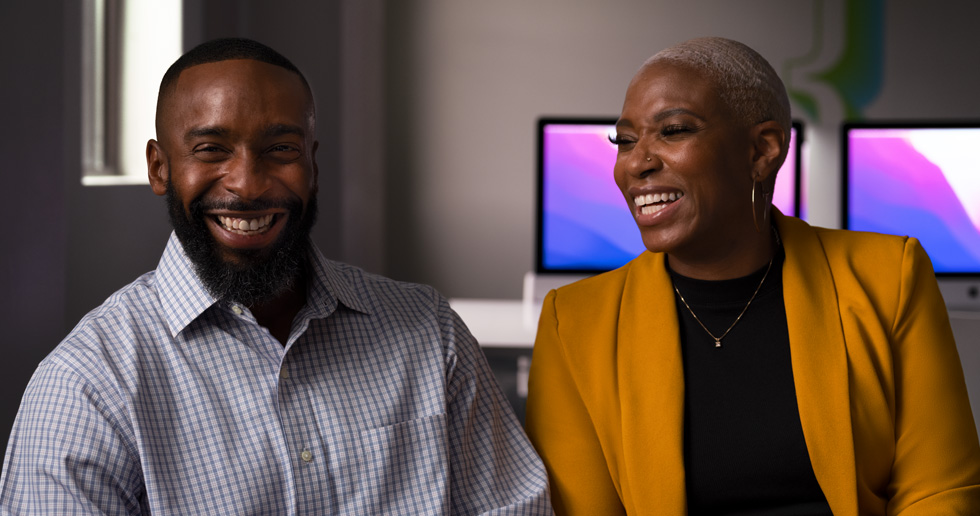
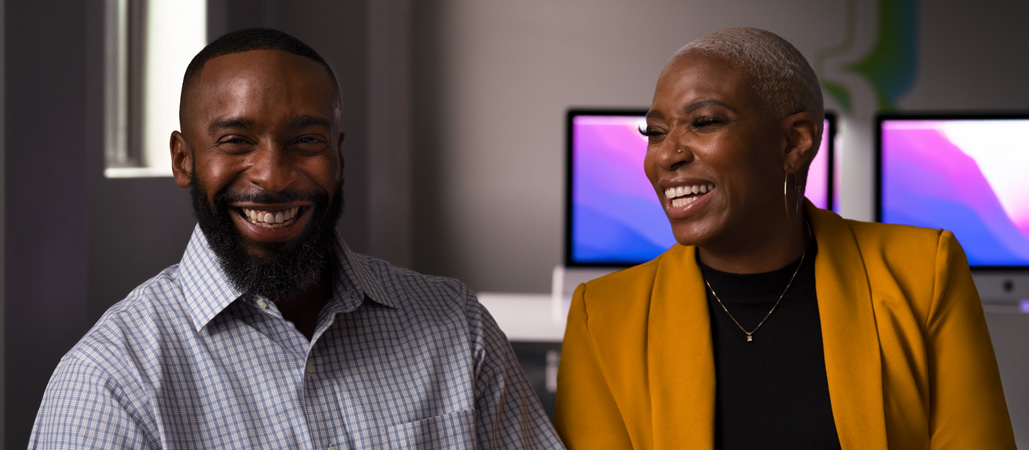
Communities on the rise.
There’s a saying, “The best time to plant a tree was 20 years ago. The second-best time is now.” In Birmingham, Alabama, Ed Farm intends to grow digital skills and talent across the tech field for generations to come. In early 2020 Apple partnered with Birmingham City Schools, the Alabama Power Foundation and TechAlabama to launch Ed Farm to foster educational equity and develop the workforce of tomorrow. Opportunities and technology are now more accessible in this community-driven education ecosystem.
Birmingham area residents of all ages can participate in Ed Farm in a variety of ways. The Teacher Fellows programme, with the support of Apple Professional Learning Specialists, develops educators who are passionate about innovations in learning and helps them integrate Apple’s Everyone Can Code curriculum into their lesson plans. The Student Fellows programme cultivates skills in middle and high schoolers through Challenge Based Learning (CBL), an approach to leveraging technology to solve real-world problems. And the Pathways to Tech programme offers a free course on Apple’s Swift programming language that also promotes the attainment of post-secondary credentials. Ed Farm connects to Birmingham in a unique way as it’s supported by and for the community, all to reimagine education through technology.
“You’re never too old to learn something new. If you’re not learning, you’re not growing”, says Nikia Hackworth, a Pathways to Tech programme participant.
Nikia Hackworth found Pathways to Tech to be a life-changing experience for her and her family. After a long career in the financial industry, she discovered information about Ed Farm on social media, and it piqued her interest. She says, “You can’t go wrong with learning something new” when describing her Pathways to Tech experience and how she gained more knowledge about code and technology. She began to apply these digital skills towards a new career as a business analyst. Hackworth’s role isn’t rooted in writing a coding language; it’s to speak the language that involves code as she works as a liaison between technology and business teams.
Ed Farm doesn’t just teach people how to code, it shows that the tech field has multiple paths — from product owners to project managers to business analysts like Hackworth, and more. She firmly believes that “education will help you grow. The more you know, the more you grow.”
Ed Farm is a digital education partner for communities and its impact spans K–12, higher education and the workforce — helping to transform Birmingham into a southern Silicon Valley. This partnership shines a light on opportunities Birmingham residents may not have known existed and opens new doors for growth. According to Hackworth, “In order to grow, we have to get out of the small box we might find ourselves in, and go into another box where we could blossom to be the big tree that we’re supposed to be.”
UP NEXT
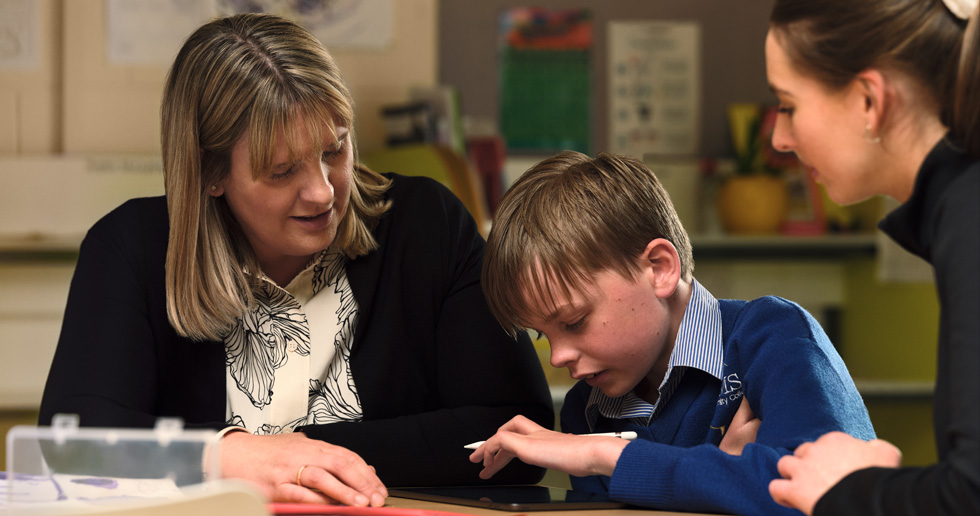
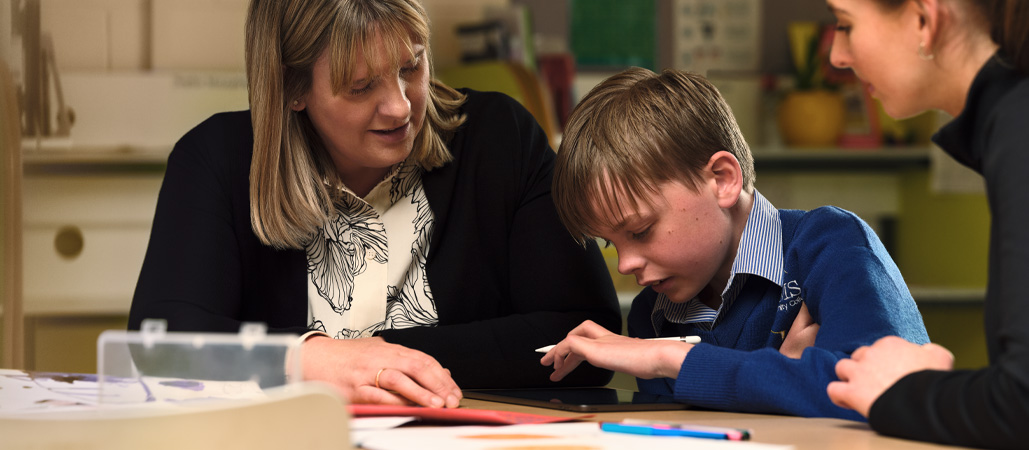
A culture of creativity and innovation.
Hollyhill, a suburb of Cork City in Ireland, is home to Apple’s European headquarters. It’s also the home of Terence MacSwiney Community College, a Cork Education and Training Board School serving students from ages 12 through 18. In 2015, the school’s leadership entered into a partnership with Apple.
As part of this collaboration, Apple volunteers began working alongside teachers at the school to help implement the Everyone Can Code and Everyone Can Create curricula, aimed at increasing student engagement through coding and creativity. Additionally, Apple provided the necessary funding and technology so the students could have hands-on learning experiences.
The partnership was a positive spark for the community. The students at Terence MacSwiney Community College were now being exposed to the latest in technology and creativity. And from working with Apple volunteers, they started learning about careers that many of them didn’t know existed. “These very interesting people came into our school and opened the students’ minds to possibilities and dreams for themselves”, says Eva Corbett, a post-primary teacher at Terence MacSwiney.
“A lot of the kids don’t think they’re creative until they come to the Everyone Can Create class”, says Corbett. “But they start drawing on their iPad and end up discovering a new world of innovation.”
Corbett, who teaches Apple curriculum–based courses, has witnessed the impact of the partnership first-hand and has numerous anecdotes of student success. One of these stories comes from an Everyone Can Code class, where students developed an app prototype called Food Fund. “The app was designed to assist with the management of a social action project, also created by students, to reduce food waste in local schools, redistribute food to a local charity called Penny Dinners, and raise awareness of food needs in our community”, says Corbett.
Another story that Corbett shares is about a group of girls who wrote an original song called “Live Out Loud” in an Everyone Can Create class. The anthem they composed was so powerful that it was selected to be part of a government-led national campaign to celebrate LGBTI+ young people. The group is now using GarageBand and iMovie to produce their own music and videos. “In terms of how it will impact their future, it’ll give them confidence to try new things”, says Corbett.
Ultimately, Corbett says, the partnership with Apple has brought a culture of creativity and innovation to Terence MacSwiney Community College. “A lot of the kids don’t think they’re creative until they come to the Everyone Can Create class”, she says. “But they start drawing on their iPad and end up discovering a new world of innovation.”
Equipping
today’s
learners for tomorrow’s opportunities.
We’re helping to prepare people of all ages with creative learning, skill development and real-world experiences that support future careers.
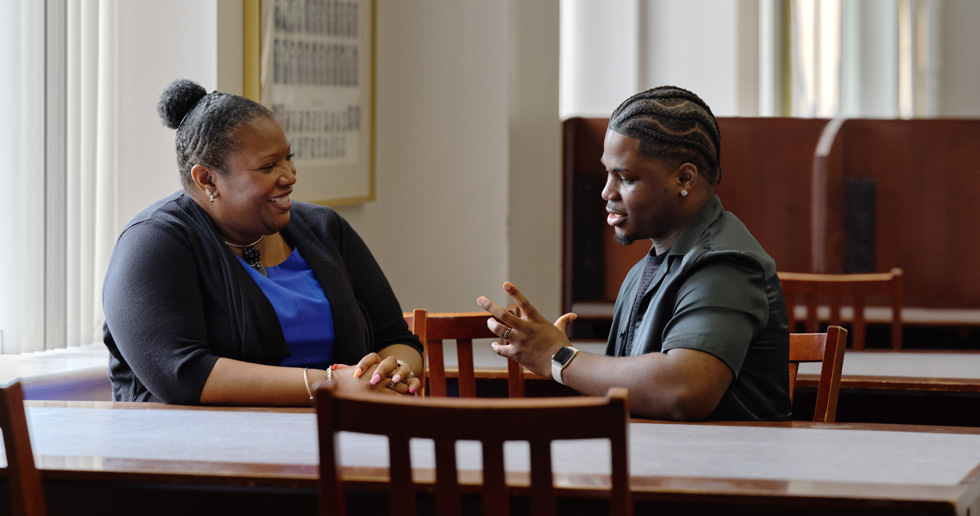
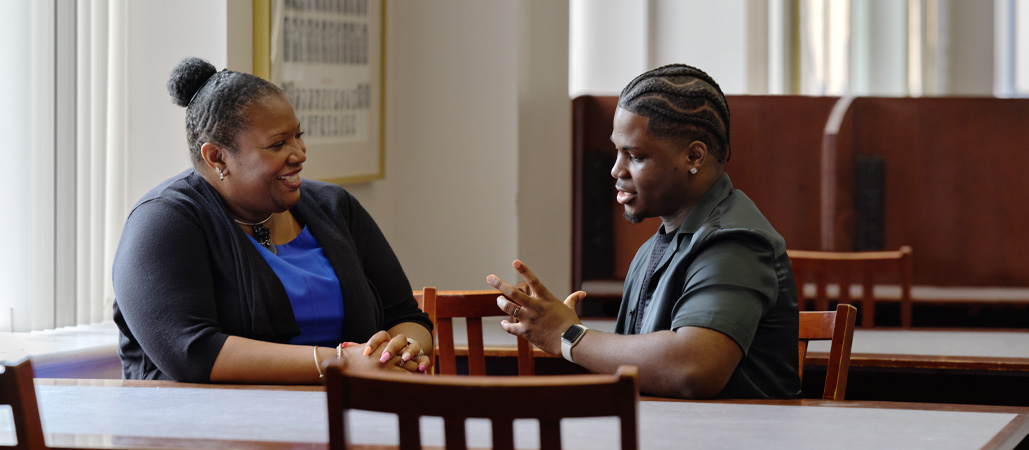
Building trust. And apps.
Rutgers University–Newark has the most diverse student population in the country, with many students pursuing degrees while undocumented, unhoused or navigating other obstacles. University educators agree that getting this population into university, and across the commencement stage, requires reaching them while they are still in high school. And they believe that one of the best catalysts for success is coding.
To help bridge the gap from high school to university, university leaders created a 7-week camp called (G)eneration Code. Spearheaded by former Vice Chancellor Dr Sherri Butterfield and co-developed with Prime Factors Learning Lab, the camp takes a holistic approach to youth development. Prime Factors is a non-profit started by Newark native and Harvard alumnus Elliot Ikheloa along with his childhood friends Emmanuel Larose and Daniel Gadabor. They founded the organisation to give back to their community, and they work with Rutgers–Newark to nurture local high schoolers’ future ambitions.
Students learn to code using Apple-developed curriculum and build a fully functional app in 7 weeks using the Swift coding language on Mac and iPad. They also do hands-on team-building activities like rock climbing and art — even designing a mural that’s displayed on campus.
Apple supports the programme with Mac and iPad devices and connects students with Apple employees across departments, demonstrating that there are opportunities for them in an advancing tech world. Apple also provides scholarships and professional learning opportunities within the Community Education Initiative network to offer more advancement in app development and Swift training.
One Rutgers University–Newark student, Muhammed Fakunmoju, participated in (G)eneration Code as a high school junior. At the time, he wasn’t sure which university he’d choose and was hesitant about his future in higher education as an undocumented student. But after connecting with the Rutgers–Newark community and faculty, he experienced the care and dedication of the school’s leadership and knew he had found the right school. Fakunmoju is now in his second year at Rutgers–Newark on a scholarship and interns in the Vice Chancellor’s office. Through a programme supported by Rutgers–Newark, the university even helped him on his journey to become a citizen. He credits his experience with (G)eneration Code as a turning point in his educational and personal journey and has returned to the programme as a junior instructor.
“I just want to change the world, and I feel like computer science is going to help me achieve that”, says Fakunmoju.
Many other (G)eneration Code students are making an impact on the Newark community by using Swift and Xcode on Mac to build apps that address community issues. One app helps the community find access to healthcare, while another addresses local food insecurity by helping people connect with nearby food banks.
The partnership between Rutgers–Newark, (G)eneration Code and Apple shows the impact that inclusive and comprehensive student coding programmes can have — and the importance of institutional support.
“For administrators, it’s about dismantling systems or putting new ones in place that make it easier for students to realise their potential”, says Dr Butterfield.
UP NEXT
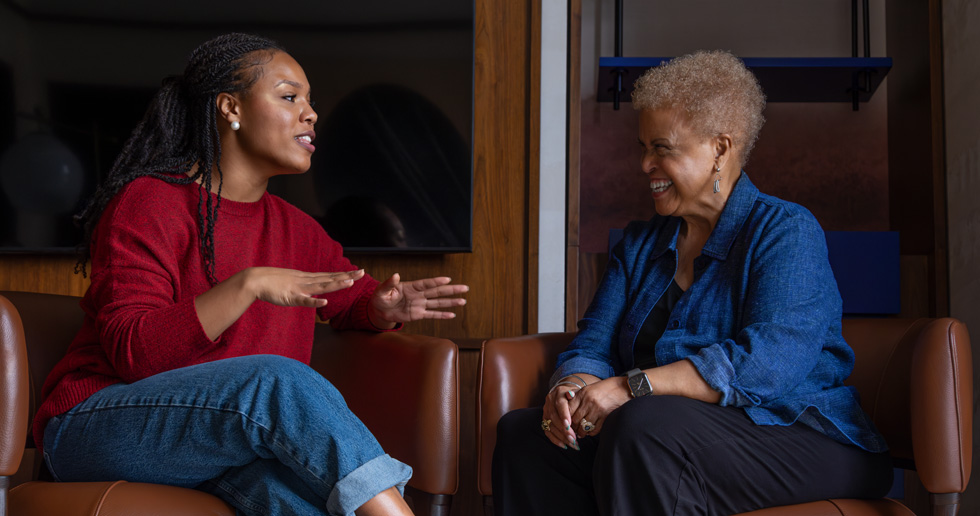
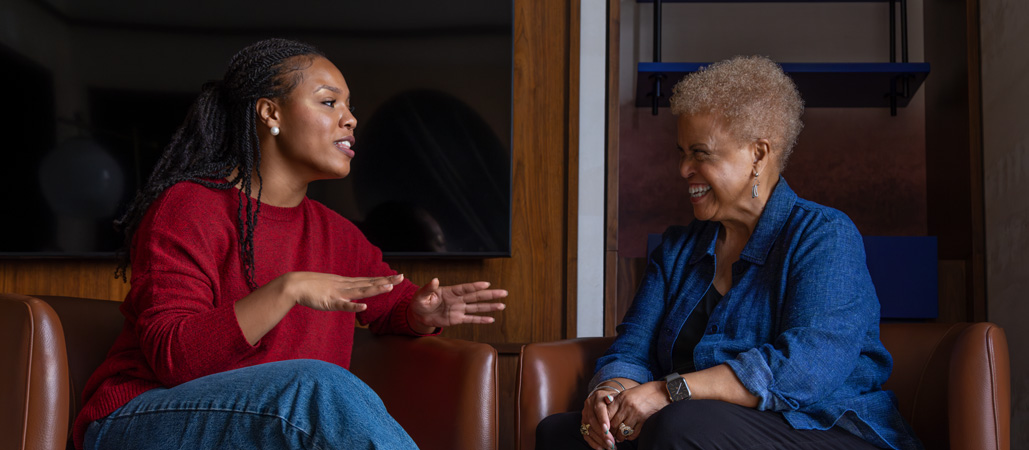
Inspiring generational change through community mentorship.
As a former middle school educator–turned–entrepreneur, Seretha Tinsley has spent a lifetime giving back to her community through mentorship. Serving in various leadership roles within the National Coalition of 100 Black Women, Inc., since 2009, she found inspiration and purpose mentoring young Black women and girls in the community, while ushering in a new generation of young leaders inside the organisation.
Serenity Bryce, a young leader who joined the organisation as an intern in 2020, now partners with Tinsley to lead the organisation’s most impactful education programme, Keeping It 100 with Code. Though generations apart, both women are shining examples of mentors, bridging their individual experiences into a collective mission to expose youth to coding.
“Coding is in everything we do. We realised that we needed to be informed, and to ensure that our young people are informed, have access and are enlightened”, says Tinsley.
With 62 chapters across 27 states, the National Coalition of 100 Black Women, Inc., advocates on behalf of Black women and girls globally and strives to be a catalyst for change for gender equity in health, economic opportunity and education. With relatively few young Black women represented in the technology sector, Tinsley and Bryce recognised the need for a programme that leveraged the technology students already had in hand to teach them a brand-new language that would prepare them for careers in technology.
Students participating in Keeping It 100 with Code have no prior development experience, and many come from under-resourced communities. In 5 months, they move from beginning to advanced levels of coding curriculum based on Apple’s Everyone Can Code programme. An impressive 80% of students graduate and share their coding projects, with advanced students sharing app designs using Xcode. Apple supports the programme by providing devices, programming content and mentors from across teams within the company.
“The programme not only teaches code, but creates a space where young people can collaborate positively with their peers”, says Tinsley.
Tinsley recalls a student who was more reserved than her peers. During the programme’s graduation ceremony, she revealed that she had a learning disability that prevented her from participating fully. Over the course of the programme, that student gained the confidence to use her voice and express how she accomplished something she never thought she would: She learned how to code.
“The best part of working with these young women is watching them grow and build their confidence, ready to be sent off into the world. For me, it’s the best part of my job”, says Bryce. Students learn how to solve problems, identify errors in their code and work together to find solutions. These important skills are instilled within students to set them up for success and carry them through life.
Using coding as a foundation, Tinsley and Bryce are working together to improve the career outcomes of future generations of Black women and girls in technology. Their story represents the desired outcome of the programme itself. When mentorship is activated, in this case between two women in an organisation, it can cause a ripple effect that impacts the programmes that are designed and the effect those programmes have on the communities they serve.
“Working with Miss Seretha is a true blessing and honour”, says Bryce. “As young women in this generation, just like many of the women and girls in our programme, we are looking for mentors who can show us the way and give us the confidence to fly.”
“I’m a firm believer that if you expect the best from someone, you’ll get the best”, says Tinsley.
UP NEXT
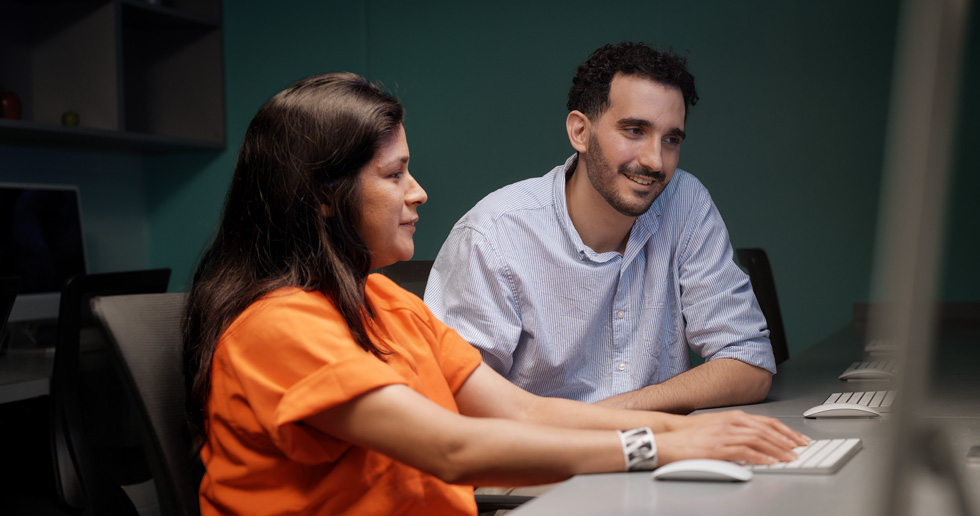
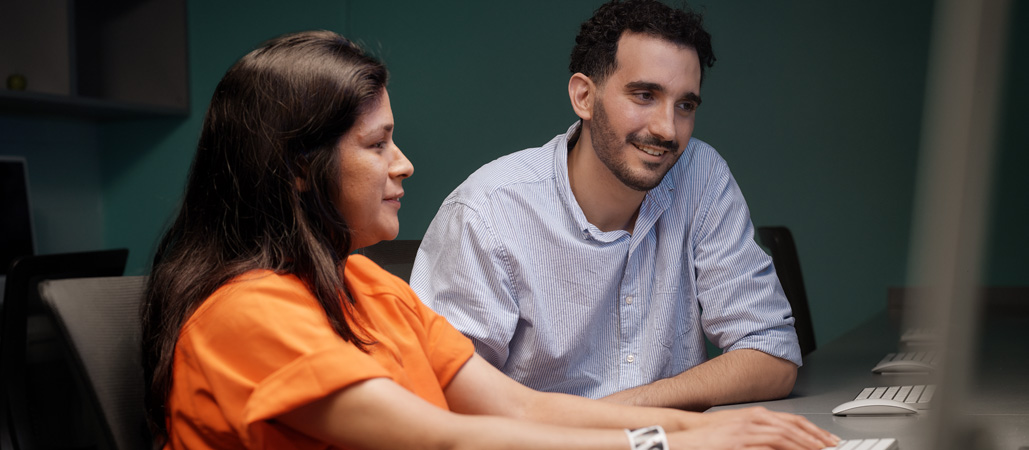
Preparing educators.
Creating opportunities.
The Women’s Empowerment Center, an extension to the county jail, opened in February 2023 in the heart of Houston, Texas, to help incarcerated women transform their lives. The programme founders and staff are dedicated to helping women secure meaningful employment and break the cycle of incarceration. The centre provides comprehensive support including educational programmes designed by Houston Community College. It also offers skill-building workshops, mentorship opportunities, and personal development and emotional healing.
One of the classes offered is the 6-week-long course Apple Technology Fundamentals, taught by Jorge Gabitto — known as Mr G to his students. Gabitto is an impassioned educator with a deep desire to give back to the community and make a difference in the lives of those who often feel forgotten.
”I want everyone to know that people who are incarcerated are human. They need skills to move forward and get a job”, he says.
Gabitto believes in the transformative power of education, recognising it as a vital tool for rehabilitation and empowerment. During his Apple Technology Fundamentals course, residents of the Empowerment Center spend time in an Apple lab equipped with iMac, MacBook Pro and iPad devices. They learn to use Numbers to create spreadsheets, manage budgets and use pivot tables for business. Writing is one of the programme’s core competencies, so residents use Pages to compose professional letters, create resumes and write letters to family members. Many residents are interested in creating music, so Gabitto designed lessons using GarageBand to give students creative, therapeutic ways to express themselves. Finally, every learner is introduced to coding using Swift Playgrounds. This programme introduces the women to coding and to careers in STEAM.
Christina, a resident of the Center, explained that she has struggled with addiction most of her life and has been in and out of the incarceration system since she was 15. She has found the Women’s Empowerment Center to be different from the county jail — it’s helped her rebuild and learn important life skills.
“I have goals that I want to accomplish, and I know that I can reach them because of this programme. And the Apple Technology Fundamentals class has given me a second chance by expanding my career choices”, Christina says.
Christina also enjoyed the writing class. “I wrote a letter to my father who just passed away, and I wrote my 11-year-old daughter a thank-you letter because she has had to step up while I am in here.” She has gained a newfound confidence in herself and her abilities. “I’ve been through so much. I know that I can be somebody, I’ve seen it in myself. I’ve come this far.” Christina plans to complete her General Educational Development (GED) degree and continue her education upon release, and she wants to be an electrician.
This initiative stands as a testament to the power of opportunity and the resilience of the human spirit.
UP NEXT
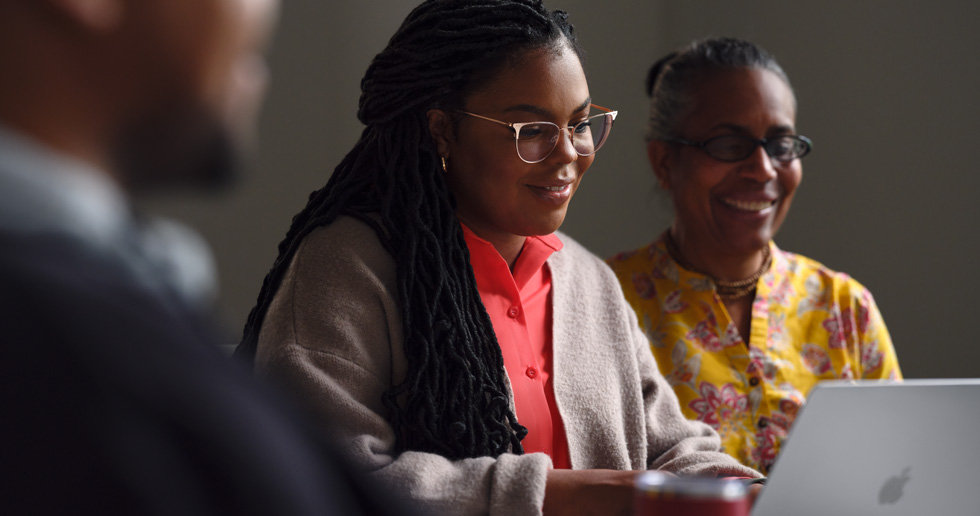
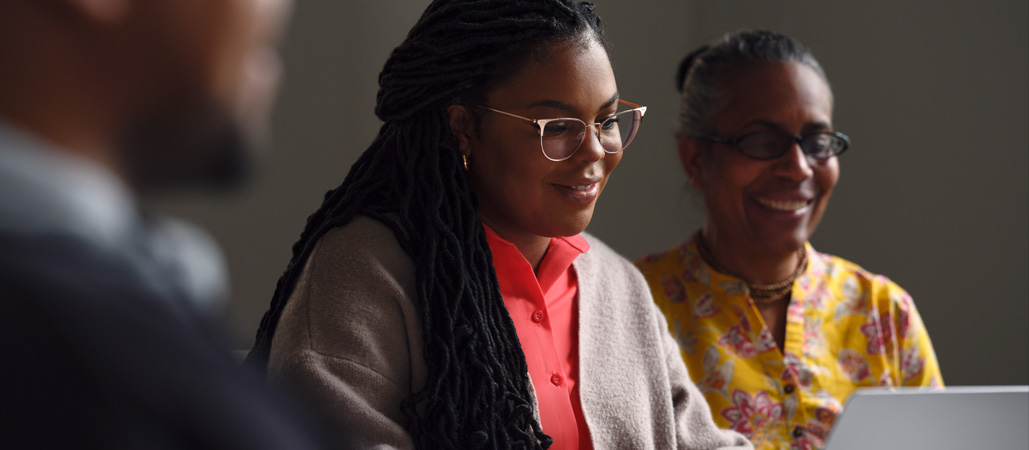
Developing home-grown talent in Detroit.
Ohio native Telayne Keith says, “I believe in my students so much and what they’re capable of doing. Whether they see it or not, I see it.” Keith brings a passion for education and community everywhere she goes. She’s one of many talented individuals in Detroit who are paving new paths in today’s tech-driven world — she initially worked as a facilitator at the Boys & Girls Clubs of Southeastern Michigan (BGCSM), teaching the principles of human-centred design and app prototyping, and she is now a lead design mentor with the Apple Developer Academy.
Since July 2021, Apple has teamed up with BGCSM and Grow Detroit’s Young Talent (GDYT) to support the Code to Career programme. It brings students ages 16 through 18 together to develop solutions to community challenges — in areas such as sustainable fashion and mobility — to build skills in preparation for higher education and future careers.
As a facilitator, Keith incorporates Apple’s Challenge Based Learning (CBL) — an approach to leveraging technology to solve real-world problems — and guides groups of students to identify community needs and develop creative solutions. “We can’t build on what we already have without expanding what we know”, Keith says. “Curiosity is so important.” Her students are able to realise their inner creative potential and discover how they can each make a difference. Keith reflects on her own upbringing, recalling how her mother used methods similar to those of CBL, encouraging her to find answers through research and field trips to museums.
“Education isn’t necessarily four walls and a book, it’s what you learn from the people around you who don’t look or think like you”, says Keith.
Even though her students don’t have prior coding experience, they are able to confidently present their app prototypes to judges and Michigan legislators by the end of the programme. Some students go on to join the Apple Developer Academy Foundation Programme — a month-long introduction to coding and design — and some even apply to the academy’s year-long programme.
Keith believes “There’s always a way to carve out your own way through life. And education makes that possible.” Keith and the Apple Professional Learning Specialists that support BGCSM are fostering a cycle of constructive development across communities in Detroit. Apple Developer Academy students are returning to their alma maters to share their journeys and inspire younger generations. For Keith, “Education is truly power”, and education empowers each and every community member to develop an even greater Detroit.
UP NEXT

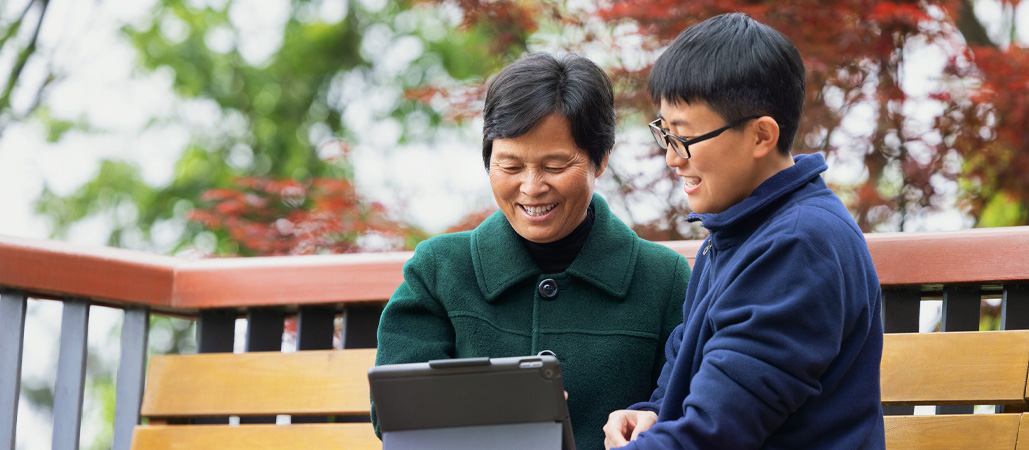
Tradition meets technology.
Ya’an, Sichuan, is home to the earliest tea plantations ever recorded in written Chinese. The city’s four rivers and surrounding peaks form an ideal environment for growing tea. And its world-renowned home-grown tea is soon to be matched by its invaluable home-grown talent.
In 2015, Apple began supporting the China Foundation for Rural Development (CFRD) to help organise farmers into cooperatives to train them to sell their products more efficiently. Cooperative leaders help develop farmers’ skill sets and promote entrepreneurial growth across China’s e-commerce ecosystem. In 2020, Apple supported the CFRD in establishing the Mengdingshan Academy to provide digital skills training for more than a thousand cooperative leaders every year.
Cooperative director Ying Wang learned how to utilise technology and devices like iPad to farm smarter. She says that everything used to be done with paper notes, and iPad made it easier to learn the information and skills needed to improve tea production. Many of the farmers who enter the Mengdingshan Academy have never seen or used tablets before; leaders like Wang motivate them to learn because she believes technology is empowering for the community. More than 3,300 rural cooperative leaders like Wang have received digital skills training at the academy.
At the same time, with the support of Apple, the CFRD has worked with partners to develop an ecological environment curriculum for rural revitalisation. The training is designed to promote sustainable development awareness and enhance the capabilities of leaders of rural cooperative organisations.
“Cooperative directors are like seeds in communities, taking root and sprouting”, Wang echoes her teacher’s words when considering the impact of education. The academy incorporates a wide-ranging curriculum — from seasonal produce efficiencies and supply chain knowledge to marketing and ultimately how to better sell products. Farmers and entrepreneurs are able to leverage their new-found digital skills to grow even better tea for export and thrive in their local economies. Wang continues, “We’re in the age of technology and information, it’s not the traditional agricultural era anymore. Training our talents helps us achieve transformation.”
Before the Mengdingshan Academy, many young people in Wang’s village left for the cities in search of opportunities. Now they’re choosing to stay in their villages because of thriving industry standards, access to innovative technology and more practical training. Wang is thankful that young people are staying, and she’s hopeful that new talent will arrive in the village to help build a more prosperous community together.
The CFRD is expanding the scale of the academy’s best practices to rural areas in more provinces. Apple has also awarded scholarships to 20 outstanding rural cooperative leaders to help them better develop their business — and encourage a new cohort to learn independently and move the countryside forward.
“Education has an influence on every step we take on the journey of our life”, says Wang.
As cooperative director, Wang studies and researches ways to better manage her cooperative and unite members. As a result, income for cooperative members has increased and their digital skills are continually improving the quality of their product. Ya’an’s reputation for tea is growing more and more because of these talented individuals. Wang believes, “When we are born everyone is the same, nobody knows anything. It is only education that brings you the ability to create who you are. Then you are safe enough to swim around and enjoy your own journey.”
Advancing equity through education.
We partner with and support Black, Hispanic/Latinx and Indigenous communities to amplify their reach.
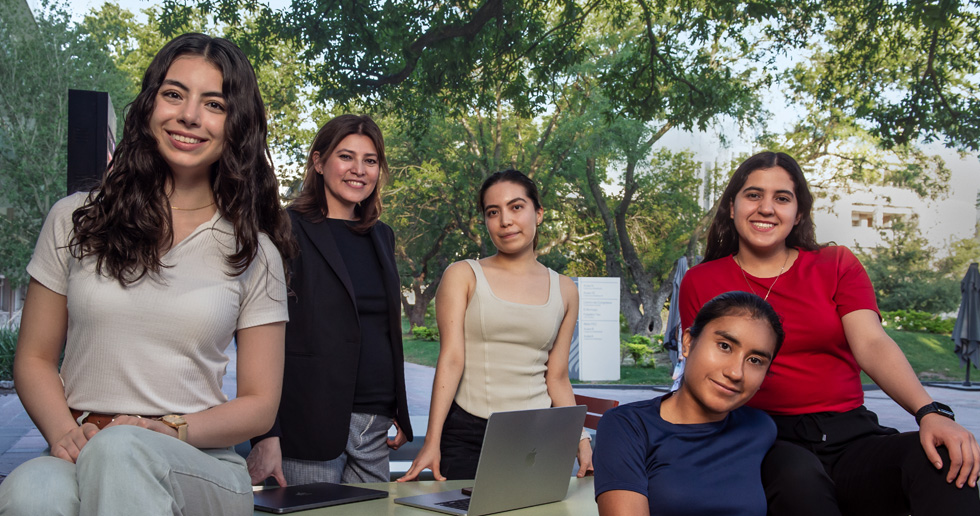
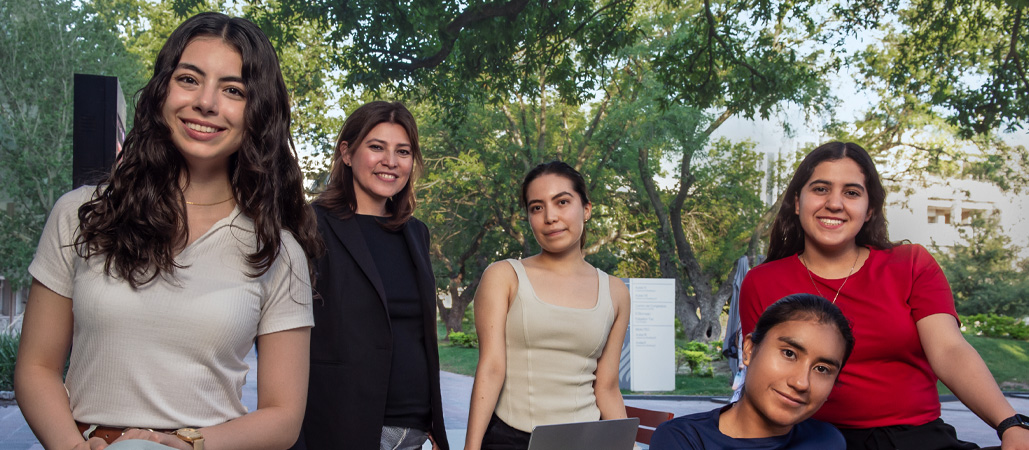
Local solutions with global reach.
For non-profit organisation Enactus, creating opportunity and improving the world both begin at the community level. In partnership with global business leaders, Enactus creates entrepreneurial solutions to local issues, fostering sustainable change with long-term economic impact.
The Enactus Community Change Makers programme, a partnership with Apple, achieves these goals by expanding equitable access to computer science in colleges and universities and helping students build careers in Mexico’s growing iOS app economy.
There are nine universities in the programme, including Tec de Monterrey (Tec), with a total of 12 iOS Development Labs. Each lab is equipped with Mac and iPad devices donated by Apple and with curricula inspired by Apple’s Challenge Based Learning framework and Everyone Can Code resources. Since 2017, lab managers and professors have taught students how to leverage technology in meaningful ways through Swift coding courses, and in 2021 added introductory computer science lessons for youth in their greater community.
For Tec professor and Apple Distinguished Educator Elvia Rosas, this means inspiring her students with “what if?” questions and asking them to imagine the world as they would like to see it.
“Technology has the power to create solutions that solve some of the problems in our community”, says Rosas.
Rosas is one of the professors participating in Enactus’ Community Change Makers programme. She began teaching computer science at Tec after working in the tech industry for 14 years. Since creating her first software program as a young girl in a small town near Monterrey, Rosas has believed in code as a means of building community and creating meaningful change. She encourages her students to “really understand that we can make a difference in the world”.
Many students begin her course with no coding experience. Within the first 5 weeks, they begin developing with Swift, creating machine learning algorithms using Apple’s CreateML framework and developing spatial computing apps for Apple Vision Pro. By the end of the 10-week course, one cohort collaborated with Tec’s School of Medicine and Health Sciences to develop custom apps — including an app that uses computer vision to help identify where to place stitches around a wound and another that uses CoreML models to analyse lung X-ray images.
Across the Community Change Makers programme, hundreds of students participate in hackathons backed by Apple, with challenges set by leading Mexican companies and tackling issues like gender equity, health and well-being, education and sustainability. Students develop app-based solutions using Swift and Xcode and present their work to companies with openings for iOS developers.
A member of Enactus’ first woman-focused national hackathon’s winning team, Gaby Sanchez, used her experience to further a career in software engineering. “Ever since winning, I haven’t stopped. I’ve been to five hackathons. It’s beautiful to see so many people, especially women, that have the same passion as you.” Sanchez, a student at Centro de Enseñanza Técnica y Superior University of Tijuana, continues to stay in touch with other hackathon participants to collaborate and workshop ideas.
Mexico’s representation within Enactus’ global programming continues to grow. When Executive Director Jesus Esparza joined Enactus in 2009, Mexico was the smallest member. Now the country represents almost 50% of its active projects and is proud to have supported universities with 15 winners in the 2024 Apple Swift Student Challenge. Esparza champions the programme’s global platform as much as its local impact: “We are building a global community. Not just with ideas, but with actions.”
UP NEXT
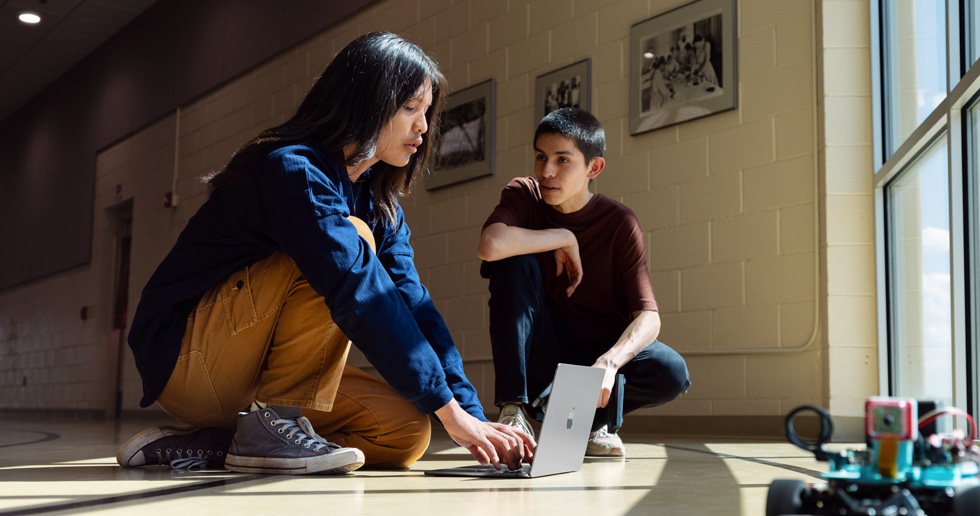
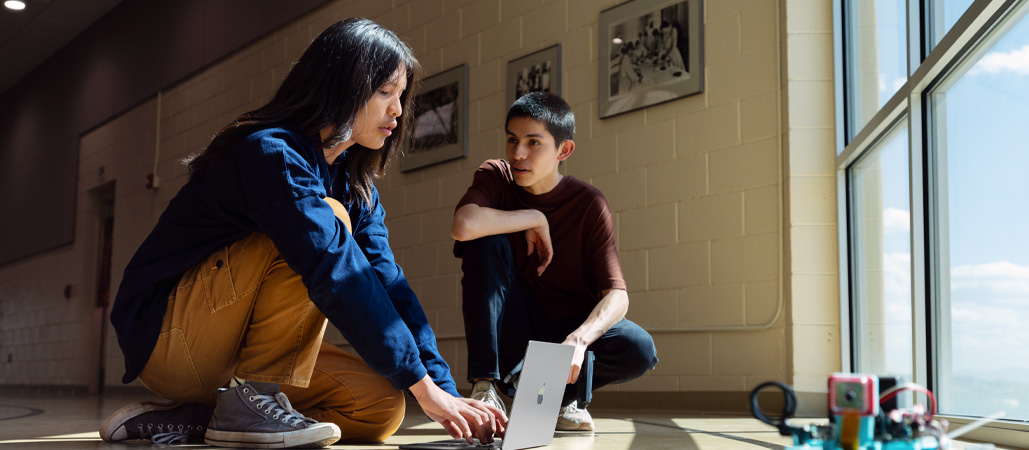
Blending code, culture and creativity.
Santa Fe, New Mexico, is known for its historic architecture, vibrant arts scene and distinctive Indigenous, Spanish and Mexican cultural heritage. It’s also home to a burgeoning tech industry. But many local Indigenous and Hispanic/Latinx youth do not have equal access to these tech opportunities.
Santa Fe Community College set out to bridge the gap, launching the Santa Fe Creative Coding Initiative to expand offerings in digital creativity and coding to learners and educators throughout the city. With support from Apple’s Community Education Initiative, this partnership brings a unified coding curriculum to Santa Fe Public Schools, Santa Fe Indian School, Boys & Girls Club Santa Fe/Del Norte and STEM Santa Fe. Students and educators learn in classrooms, at conferences, in newly opened tech labs and on the university campus.
For Santa Fe Indian School (SFIS), becoming a partner meant outfitting its computer science labs with iPad and MacBook devices provided by Apple — and reinvigorating the department led by instructor Kate Sallah. Originally founded by the federal government as a tool to assimilate Indigenous children, the school now educates children from tribes across the Southwest in a manner that supports and preserves their culture and traditions. In addition to courses on Native languages and land preservation, the computer science programme, in partnership with the Santa Fe Creative Coding Initiative, incorporates digital creativity and coding into its curricula. Students take on projects centred in their own tribal identities and learn skills to share with their local community.
Sallah encourages students to code what they’re interested in, and they also learn to pair their Apple devices with programmable electronic platforms like Arduinos and other hardware. Many of her students take inspiration from Santa Fe’s dynamic art culture. One group of middle schoolers is building a laser guitar modelled after an installation at the Santa Fe location of the immersive art experience Meow Wolf. Students at STEM Santa Fe are mentoring another group creating an app in Swift on iPad. Other projects are inspired by Indigenous and Latinx artwork.
“Kids can really utilise their background and cultural knowledge”, Sallah says. “You can express yourself any which way.”
The Santa Fe Creative Coding Initiative has produced a ripple effect as students build connections from school to school and within their community. Sallah’s daughter Ruby, a junior at Santa Fe High School, is a peer instructor guiding SFIS middle schoolers through Everyone Can Create projects at the STEM Santa Fe STEM Pathways for Girls workshop. Her peer leadership is just one example of how the programme is inspiring young Santa Fe residents. Ruby is also a peer mentor for middle and high school students taking Sallah’s computer science classes.
“This program can open up so many different opportunities”, says the younger Sallah. “And it’s just so important in future careers.”
UP NEXT
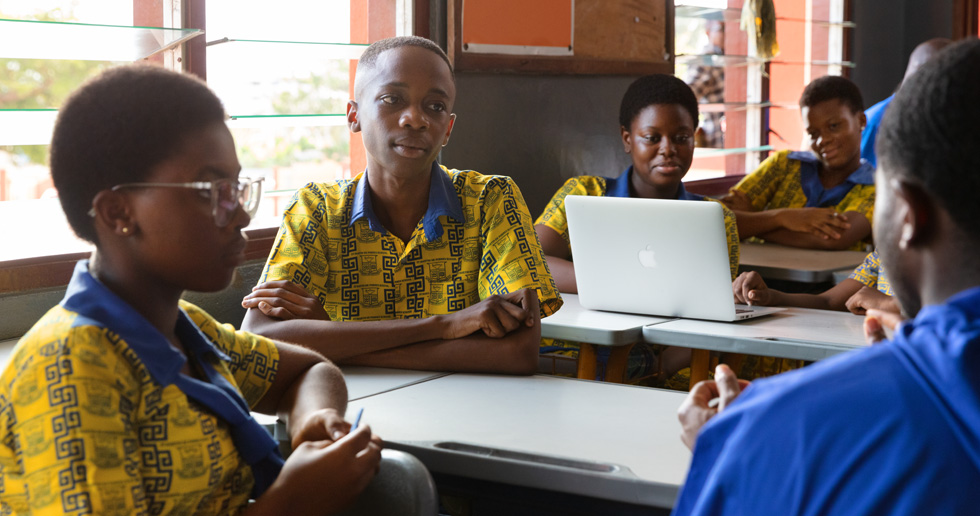
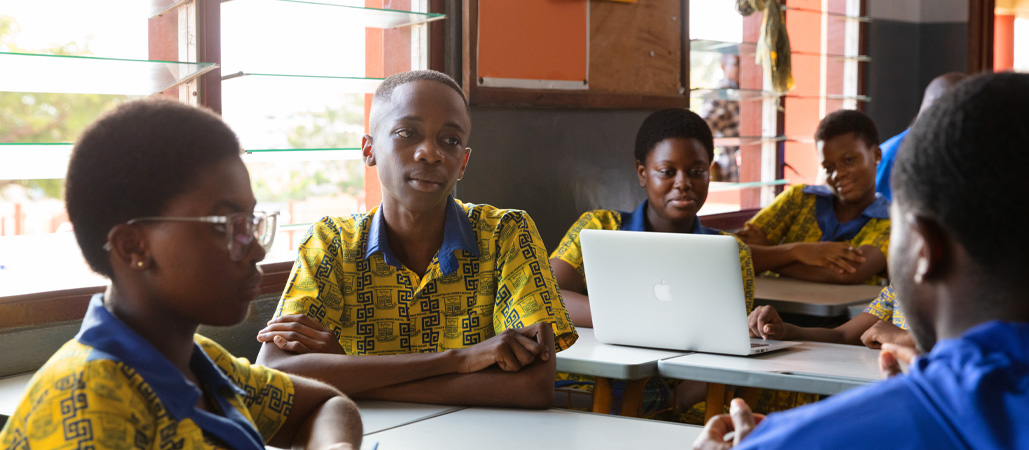
Code that reaches new campuses.
Since launching the HBCU C2 programme in 2019, Dr Robbie Melton, Tennessee State University’s associate vice president for the National SMART Global Technology Innovation Strategies and interim vice president for academic affairs, has guided the programme into uncharted territories.
In 2022, HBCU C2 expanded beyond the United States into Africa, serving high school and university students attending 2-year and 4-year colleges in Monrovia and South Africa. The programme has been so successful in those countries that Ghana also requested the programming.
In partnership with the HBCU African Education Coalition (HAEC), the programme offers its TSU-accredited Apple coding course and Apple Teacher certification training through its new SMART Center located at St Martin de Porres School in Ghana.
“We are a global world, which requires global talents. HBCU C2 is highly beneficial for Ghana due to its ability to address the country’s digital skills gap, foster innovation and entrepreneurship within the thriving tech ecosystem, and promote inclusive development by empowering diverse communities”, says Dr Melton.
The course was made possible by HBCU C2, an initiative by Tennessee State University in partnership with Apple to empower Historically Black Colleges and Universities (HBCUs) to bring coding and creativity opportunities to their home campuses and surrounding communities. HBCU C2 promotes innovation and education equity, and it aims to address community challenges using app design and Apple’s Swift programming language.
Apple helped launch the programme and is involved at various levels, from providing the grants and technology needed to scale the initiative to designing the curriculum and course content. The Apple team has also helped prepare instructors to teach the classes using the Apple Teacher Training curriculum.
In addition to the programmes in Ghana, Monrovia and South Africa, the programme has spread to 46 HBCUs, all of which have committed to serving as a Centre of Innovation in their communities. Part of this commitment includes establishing an Innovation Team to implement the programme locally, devising at least two courses each academic year with C2 strategies, and offering out-of-school coding and creativity learning experiences for all age groups, including through K–12 schools, after-school programmes and local community organisations.
This shared commitment has been instrumental in creating opportunities that are diversifying the tech and creative workforce and bridging the digital divide among under-represented minority groups.
“This expanded footprint in Africa marks a futuristic step towards our commitment to global education and fostering international partnerships”, says Dr Melton.
UP NEXT
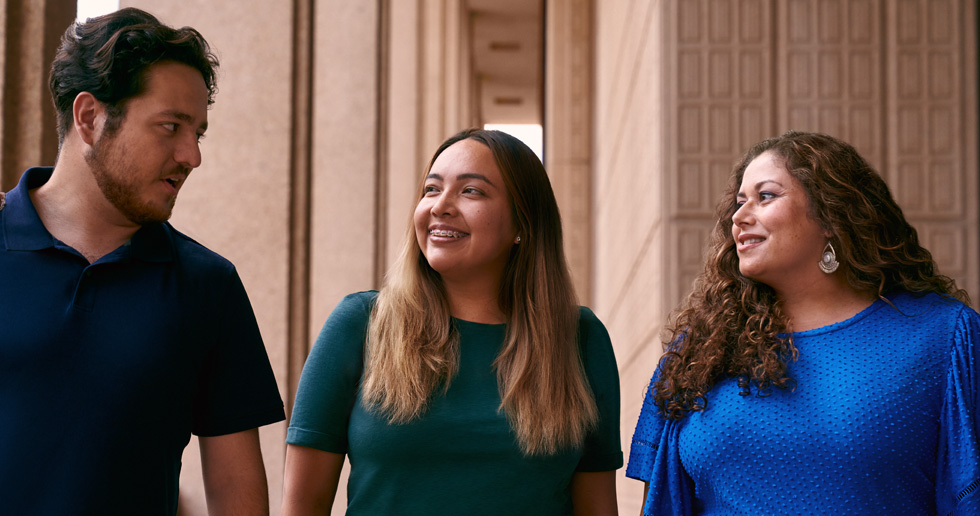
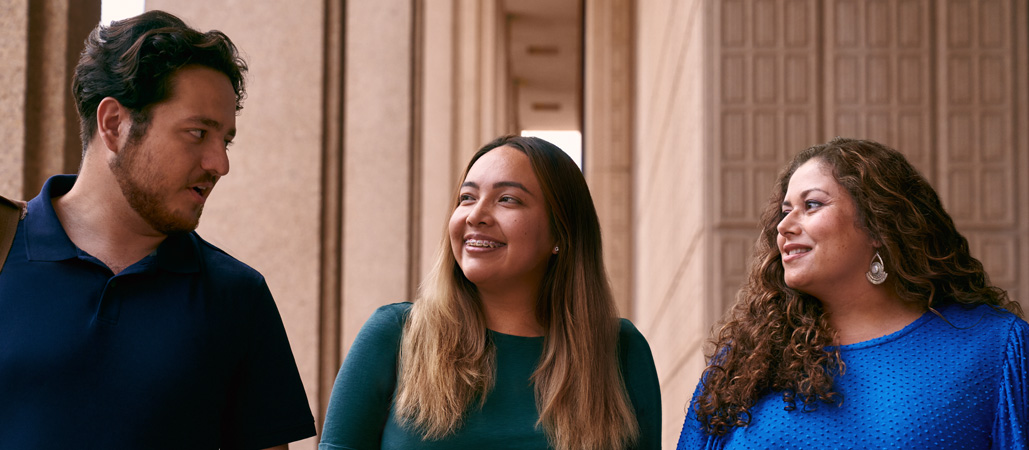
Creating access and opportunity for Hispanic/Latinx students.
For most of Amanda Quintero’s childhood, going to university wasn’t an option. As the daughter of immigrant parents who weren’t familiar with higher education, the expectation was that she’d find a job once she finished high school. It wasn’t until the last semester of her senior year that a substitute teacher first encouraged her to apply to a university. That chance encounter changed her entire trajectory. It was the moment she began to believe she had what it took — that she belonged.
Today, Dr Quintero dedicates her career to ensuring that other first-generation university students have the same opportunities she had. A leading content expert on Hispanic-Serving Institutions (HSIs) and recognised student success innovator, Dr Quintero currently serves as the Senior Advisor to the President for Inclusive Excellence and as the Equity Innovation Officer of the Global HSI Equity Innovation Hub at California State University, Northridge (CSUN).
The CSUN hub, launched in partnership with the Apple Racial Equity and Justice Initiative (REJI), makes a significant impact on first-generation university students throughout the nation, connecting diverse talent to opportunity. With Dr Quintero’s visionary leadership, this initiative transforms HSIs nationally to increase student success and equip Latinx and other minority and historically excluded students with skills for careers in science, technology, engineering, arts and math (STEAM) — starting with Miami Dade College (MDC) as the first regional hub. As such, MDC will work to advance equitable outcomes in STEAM educational pathways, workforce preparation and transition opportunities to STEAM professions, share evidence-based practices and elevate an HSI Community of Practice. Santa Fe Community College and Rutgers University–Newark act as programme collaborators, with offerings that are part of a national portfolio of innovative practices serving marginalised groups.
The ongoing goal is to move the needle on equipping a largely first-generation student population with the educational experiences and skills they will need to become first-generation professionals in STEAM fields. The Global HSI Equity Innovation Hub does this by connecting HSIs to resources, thought leaders and one another, sharing what works to accelerate educational equity, and contributing to a more inclusive and diverse future workforce.
“Diverse talent is an asset that benefits us all”, says Dr Quintero. “It’s a full circle of giving back, investing their talent with the very communities that many of the students come from to disrupt intergenerational inequity.”
“The first time my family ever stepped foot on a college campus was the day of my graduation”, Dr Quintero says, “and I don’t want that to be the experience of other students”.
The Global HSI Equity Innovation Hub signifies a shift in the paradigm from what students must do to be successful to what HSIs must do to serve students intentionally. It puts the responsibility on leadership to focus an equity lens on their structures, policies and practices. It empowers students, faculty and staff to transform institutions, which Dr Quintero says is key to an effective equity-centred approach to education. The other imperative of the programming is to engage the families of first-generation university students, who are often disconnected from campus life.
“The first time my family ever stepped foot on a university campus was the day of my graduation”, she says, “and I don’t want that to be the experience of other students”.
Whole-family programming and outreach to students and their families will ensure that access to higher education and the completion of a degree doesn’t happen by chance.
UP NEXT
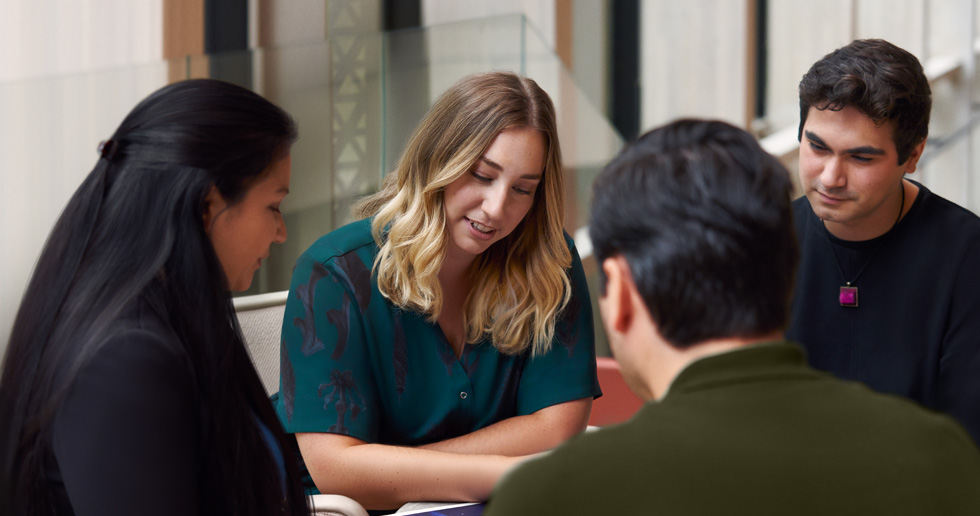
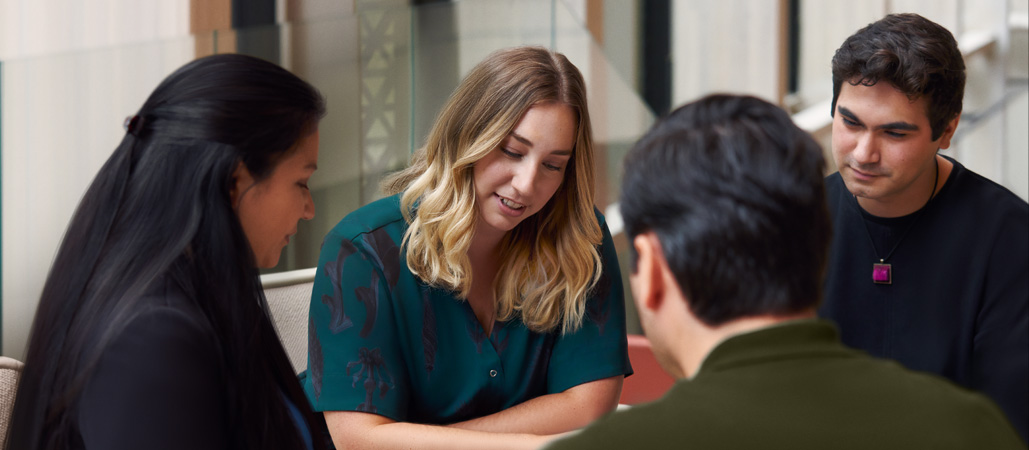
Learning First Nations’ cultures and histories.
First Nations’ history was, until recently, virtually absent from curricula in Canada. The historic and ongoing regulations of the 1876 Indian Act — which attempted to assimilate a vast, varied population of First Nations’ people into non–First Nations’ society — and the impact of residential schools that had suppressed 1,50,000 children from expressing their culture for generations were often overlooked. The last Canadian residential school closed in 1997, further fuelling the movement towards teaching more First Nations’ culture and history today.
In 2015, the Assembly of First Nations (AFN) gathered First Nations’ education leaders across Canada from coast to coast to coast. The AFN showcased a collection of artefacts, residential school maps and other materials to help educators teach Canadian history through a First Nations’ lens. Demand for this collection was overwhelming.
Apple was inspired to create a partnership with the AFN to increase educational access for Indigenous and non-Indigenous students. AFN’s Director of Languages and Learning and a member of Rama First Nations, Renee St Germain says, “Teachers and students struggle for reliable resources around culture and history.” She’s part of the ongoing project with Apple to make available digital resources related to First Nations’ history.
The result is a downloadable resource providing hands-on educational tools on First Nations’ rights, culture and history. The free It’s Our Time: The AFN Educational Toolkit includes a growing collection of interactive Apple Books that support Indigenous and non-Indigenous educators in embedding new perspectives into their classrooms and fostering a spirit of cooperation, understanding and action.
“Education is fundamental in addressing large issues, eliminating systemic racism and discrimination. We all go through education and the system needs to be changed to properly support today’s society and cultures”, says St. Germain.
Apple has helped the AFN develop 15 Apple Books in English and French. Today, the combined efforts of Apple Distinguished Educators, Apple’s Community Education Initiative, pedagogical experts, Indigenous education leaders and advocacy organisations continue to empower educators in teaching First Nations history. St Germain believes, “There’s no bad time to start the conversation for all people, regardless of age.”
Teachers are finally able to integrate First Nations into curricula effectively and spark more dialogue around this sensitive history. “Equity is at the forefront of everything the AFN does”, she says, ”and the toolkit is First Nations–led.” She emphasises the importance for First Nations’ students to see themselves accurately represented. “There are First Nations’ students in almost every classroom.” Systemic change is growing across Canada, and the toolkit is building more momentum to make education more equitable for First Nations’ students and future generations.
St Germain now works on partnerships with school boards to expand the toolkit’s reach. Because First Nations’ people are diverse, Apple and the AFN continue to work with First Nations’ education leaders to develop region-specific editions of the toolkit to better reflect their respective traditions, languages and cultures.
According to St Germain, there’s more work to be done for First Nations’ people — from housing to equal rights to cultural safety for students and teachers. Education is part of the process. As she says, “If we can’t find equity in education, where else can we find it?”
Our work in education doesn’t end here.

Striving for a world where all girls can learn and choose their future.
Apple has partnered with Malala Fund since 2018, when we became the organisation’s first Laureate partner to help scale its work for girls’ education. In providing support for Malala Fund’s grant-making and advocacy, we’re helping to accelerate progress towards a world where all girls can access and complete 12 years of education.

K–12 Education
Apple technology helps educators bring out the creativity in students with powerful products, support and curricula for magical learning experiences.

University Students
Powerful and compatible with everything you need for higher education and more. Apple devices work together so you can focus on what matters.
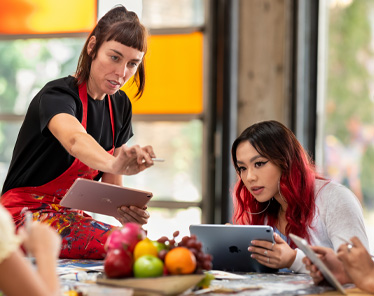
Higher Education
Apple powers innovation across every part of campus — from cutting‑edge research and sports‑day athletics to daily student and faculty life.
More from Apple on education.
Our values lead the way.
-
Supply Chain Innovation
We prioritise providing safe, respectful and supportive workplaces for everyone.
-
Accessibility
Our built-in accessibility features are designed to work the way you do.
-
Privacy
We design every product and service to keep your data safe and secure.
-
Environment
We’re committed to bringing our net emissions to zero across our entire carbon footprint by 2030.